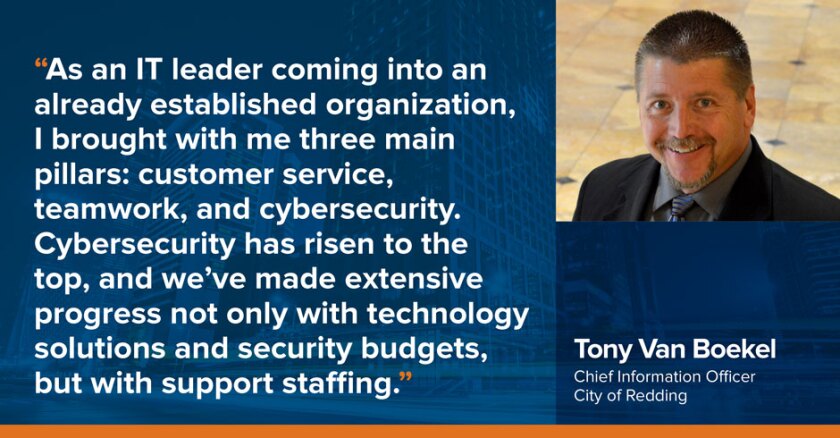As part of Industry Insider — California’s ongoing efforts to inform readers about state agencies, their IT plans and initiatives, here’s the latest in our periodic series of interviews with departmental IT leaders.
Tony Van Boekel is chief information officer at the city of Redding, a newer role at the city that evolved in 2020 from the reconstitution of technology roles.
Industry Insider — California: How do you describe your role? How have the role and responsibilities of the CIO changed in recent years?
Van Boekel: My role is chief information officer (CIO), encompassing the roles and responsibilities of the IT director and more. This change was made back in 2020, when it was decided to merge the Operational Technology staff, supporting our city-owned electric utility, with the city’s Information Technology/Geographic Information Systems group. Since the CIO position is new to the city, I would not consider this position “changing” but developing. I can say that as the CIO, the level of oversight, vision and responsibility has definitely [been] elevated, especially responsibilities in regard to federal electric utility compliance.
IICA: Does your organization have a strategic plan, and may we hyperlink to it? How big a role do you personally play in writing that strategic plan?
Van Boekel: The city of Redding operates as a council-manager form of government, whereby the council establishes policies under which the city operates and appoints a manager to administer the affairs of the city. The city manager establishes a mission/vision containing key goals and objectives that drive the efforts of all we do.
IICA: What big initiatives or projects are coming up? What sorts of developing opportunities and RFPs should we be watching for in the next six to 12 months?
Van Boekel: We are currently in the process of a forklift VoIP [voice over Internet protocol] system upgrade — to go live early next year. We are working out the bugs of a new enterprise resource planning (ERP) and a human capital management (HCM) system going live next July along with a budgeting module. We have several cybersecurity-related upgrades on the horizon as well as a migration to [Microsoft Office] 365.
IICA: In your opinion, what should local government be doing more of in technology?
Van Boekel: Cybersecurity is an obvious choice. The risk to local government is high, due to limited resources and funding to maintain and secure their respective threat landscapes.
IICA: How do you define “digital transformation?” How far along is your organization in that process, and how will you know when it’s finished?
Van Boekel: I see digital transformation as the process of introducing electronic/digital processes and processing into longstanding mainstay trusted manual processes, or in many cases replacing those mainstays. The advent of our new ERP is a huge and somewhat painful step in the city’s digital transformation, along with the HCM system including electronic timekeeping. I don’t know that we will ever be finished. I think we will be mostly digital in two to three years.
IICA: What is your estimated IT budget and how many employees do you have? What is the overall budget?
Van Boekel: Our IT budget runs around $5.5 million, with approximately 41 employees total in IT, GIS and Operational Technology. The overall city budget is roughly $400 million annually.
IICA: How do you prefer to be contacted by vendors, including via social media such as LinkedIn? How might vendors best educate themselves before meeting with you?
Van Boekel: Email is the best chance of getting my attention. I’m not an avid user of social media and do not have a LinkedIn account. I would direct vendors to our public website for insight.
IICA: In your tenure in this position, which project or achievement are you most proud of?
Van Boekel: As an IT leader coming into an already established organization, I brought with me three main pillars: customer service, teamwork, and cybersecurity. Cybersecurity has risen to the top, and we’ve made extensive progress not only with technology solutions and security budgets, but with support staffing to include a new cybersecurity officer position, and with the general city staff. We obtained a phish training tool and ... we had a click rate of 68 percent. Within the first month, staff dropped that rate dramatically and it has remained very low for six years. This is huge, given that 95 percent of nefarious activity initiates with users.
IICA: What has surprised you most this year in government technology?
Van Boekel: The exorbitant cost associated with software procurement and the surge to the subscription-based sales model, setting up continual, year-over-year revenue streams for the manufacturer. I know this states the obvious, but it’s a painful requirement on limited governmental funding streams.
IICA: What do you read to stay abreast of developments in the gov tech/SLED sector?
Van Boekel: Generally, I use Internet news and resources to investigate and educate on issues that pertain to current events affecting our local community, operations, and future projects and direction.
IICA: What are your hobbies and what do you enjoy reading?
Van Boekel: My hobbies include spending time with family/grandsons, houseboating/boating/wake-surfing, backyard grooming and enhancements. I enjoy reading technical documents and instructional/“how-to” pieces.
Editor’s note: This interview has been lightly edited for style and brevity.
Northern California CIO: ‘Mostly Digital in Two to Three Years’








